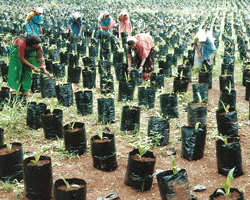
New Delhi, May 2: Making a mockery of the government’s afforestation programme, many non-governmental organisations (NGOs) have disappeared with crores of tax-payers’ money released by the government for planting saplings.
Out of 560 projects sanctioned to voluntary agencies between 2003 and 2008, proponents of 537 projects vanished midway with the first and second instalment of funds amounting close to Rs 30 crore without showing any evidence for completion of the work.
Only in 20 projects — 3.57 per cent of total projects costing Rs 1.79 crore — were all the three instalment of grants released as agencies could submit documentary evidence in support of their previous work.
“The possibility of misutilisation (of fund) or fraud is not ruled out as a majority of the voluntary agencies neither came back to the National Afforestation and Eco-Development Board for the next instalments after the release of first instalment nor furnish utilisation certificate or progress reports,” the Public Accounts Committee of Parliament said in its report.
The report was tabled in Parliament last week. While in 352 projects only the first instalment amounting to Rs 13.64 crore was released, in another 185 projects the second instalment worth Rs 15.92 crore was released. In the absence of evaluation reports and utilisation certificate, subsequent funds were not released.
Despite such clear instance of siphoning off government money, the Union Environment Ministry blacklisted only seven agencies. An FIR was filed against one officer. Environment Secretary T Chatterjee said prior to 2005, there was no specific target for plantation activity, which could be monitored. The scheme was “demand driven”.
“In afforestation programmes, monitoring should happen before monsoon to involve local community, during monsoon to see the actual planting and after monsoon to check the results. It does not happen in India most of the time,” R Siddappa Setty, a fellow at Bangalore-based Ashoka Trust for Research in Ecology and the Environment, told Deccan Herald.
The PAC report took off from an earlier auditing of the centrally-sponsored forestry scheme by the Comptroller and Auditor General in 2010.
The Environment Ministry reworked the forestry programmes in 2005 with the launch of “Greening India” project subsuming earlier schemes with an option for evaluation.
The CAG audit found that NAEB left monitoring of afforestation programmes solely at the discretion of state forest departments, whose role was restricted to verifying ground realities before recommending the same for the second instalments.
A mid-term evaluation of Greening India by Society for Social Services, Madhya Bharat, in 2007 revealed that out of 170 voluntary outfits approached by the society only 33 responded.
Around 15 questionnaires were returned due to unavailability of addresses. In addition, field inspection was conducted on 59 projects.
The evaluation found eight voluntary agencies misappropriated funds and ten outfits tried to avoid inspection. The benefits—forestation of a patch of land —have not been quantified in any of the 59 projects on which the government money was spent. “Many times, the agencies failed to identify proper species and location, which is a must for the success of forestry programmes as exotic species may not survive. The local community also has to be involved from the first point to the last point,” Setty explained.
As the government aims to cover 33 per cent of the country with tree and forest cover, afforestation always remains high on the government agenda.





Comments
Add new comment